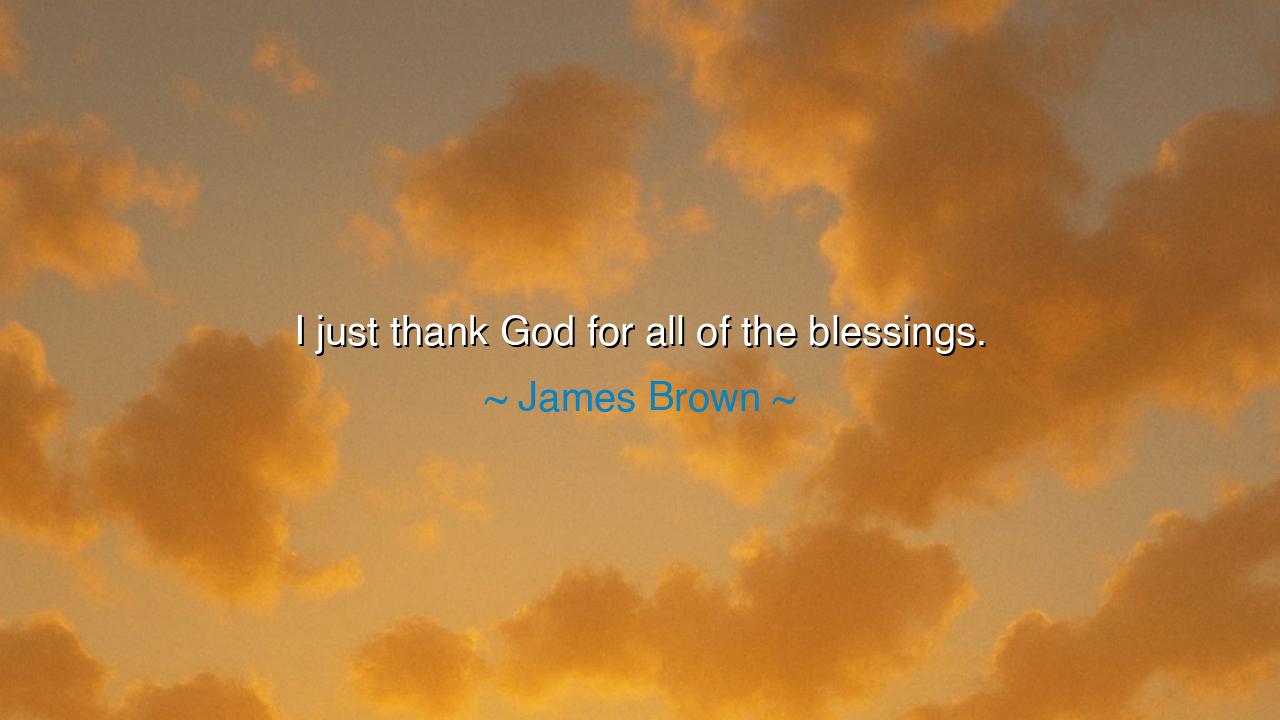
I just thank God for all of the blessings.






“I just thank God for all of the blessings.”
Thus spoke James Brown, the Godfather of Soul, whose music thundered across the ages like a heartbeat that refused to stop. His words are simple — as simple as breath, as eternal as prayer. And yet, within their simplicity lies the great truth of the human spirit: the power of gratitude. For in a world where men rise and fall, where fame flickers and fades, gratitude remains the anchor of the soul. James Brown, who climbed from the depths of poverty to the heights of renown, knew that to thank God was not merely to give words to fortune, but to recognize the sacred rhythm of grace that beats beneath every trial and triumph.
In the ancient traditions, to give thanks was not a ritual of comfort, but an act of power. The early prophets, the poets, the warriors — all knew that gratitude summoned strength. When the Israelites wandered through the desert, when the Greeks sang hymns before battle, when the sages of the East meditated at dawn — all of them bowed first in thankfulness. They understood that to thank God for all of the blessings is not to count them one by one, but to see the divine hand in every breath, in every challenge, in every day one lives to rise again.
James Brown’s own life was a living parable of this truth. Born in the heart of hardship, abandoned by parents, jailed in youth — he had every reason to curse his fate. Yet, through that furnace of suffering, he forged a sound that shook the world. His voice carried not just rhythm, but redemption. When he said, “I just thank God for all of the blessings,” it was not the cry of a man who had forgotten his pain, but one who had transformed it. He thanked God not because life was easy, but because it was possible. His gratitude was his salvation, his song, his strength.
Think also of the great abolitionist Harriet Tubman, who after leading her people through the peril of night and chains, was asked how she endured. She said, “Every time I prayed, I felt God near me.” Though danger hunted her steps, she moved in thanksgiving — not because the path was safe, but because she had a path at all. Like Brown, she knew that blessings are not always wrapped in comfort. Sometimes they come cloaked in struggle, teaching the soul endurance, courage, and faith.
When one learns to thank God for all of the blessings, the heart begins to see that nothing is wasted. The failures, the delays, the heartbreaks — all are teachers in disguise. The ancients called this the “alchemy of the spirit”: the transformation of suffering into wisdom through gratitude. For to thank God even when the cup is bitter is to drink deeply of truth. The grateful soul is unbreakable; it finds light even in the shadow.
There is a hidden power in this practice. Gratitude is not passive — it is creative. When we give thanks, we awaken more to be thankful for. The heart that blesses multiplies its blessings. The man who complains multiplies his burdens. Gratitude, like music, is vibration — and James Brown understood that vibration better than most. To thank God was his way of staying in rhythm with life’s divine beat.
The lesson, then, is this: Do not wait for greatness to be grateful. Do not wait for peace to be thankful. Begin now. Each morning, speak the words: “I thank God.” When you rise, when you work, when you rest, remember that your breath is itself a blessing. Give thanks not only for what shines, but for what shapes you. For gratitude is the gate through which joy enters, and the shield by which despair is turned away.
So let us live as James Brown sang — with fire, with soul, with thanksgiving. Let our lives be hymns of appreciation for every unseen mercy. And when the days grow heavy, let us still lift our voices and say: “I just thank God for all of the blessings.” For in those words lies the oldest truth known to humankind — that the grateful heart is the dwelling place of divine strength, and through it, even the weary shall rise again in song.






AAdministratorAdministrator
Welcome, honored guests. Please leave a comment, we will respond soon